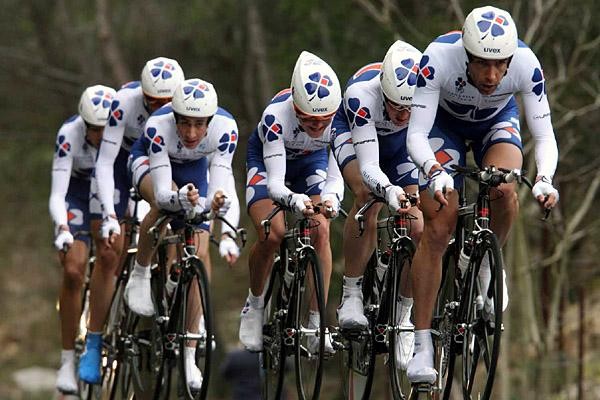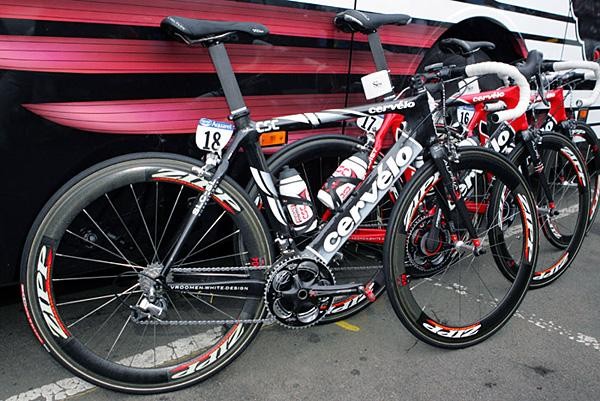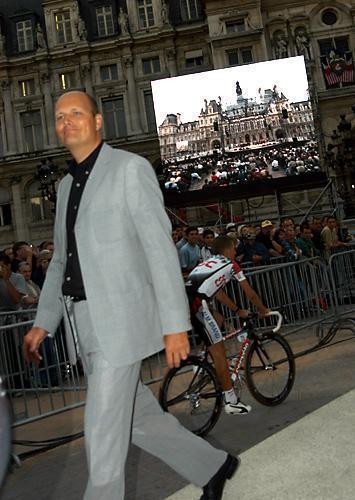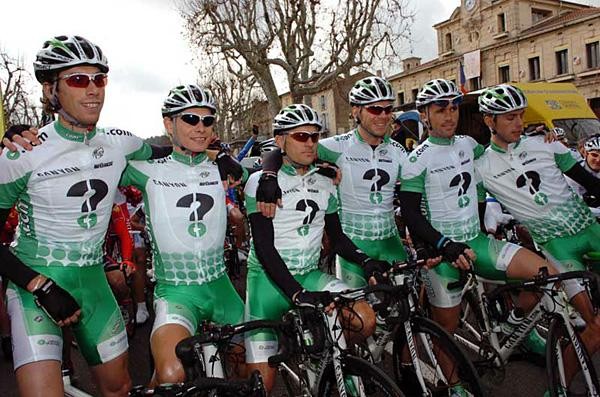Whatever happened to cycling? Powerbrokers play politics as the sport suffers
Recently, you will have read - or maybe skipped over - all this reporting on Unibet and the Grand...




News feature: March 8, 2007
Whatever happened to cycling? Powerbrokers play politics as the sport suffers
Bored with cycling politics? Don't be. It's serious. If cycling's doping scandals were not enough, the UCI vs. Grand Tour organisers spat has the potential to do irreparable damage. While some fans may turn away because of doping, to think of major events like Paris-Nice and even le Tour itself without the best riders in the world seems unimaginable. But it nearly happened this month. Although the UCI backed down and there is now a 'cease-fire', the war is far from over. So how did it get this bad? Cyclingnews' staffers Laura Weislo, Hedwig Kröner and Shane Stokes find out that it's all about the Benjamins.
Recently, you will have read - or maybe skipped over - all this reporting on Unibet and the Grand Tours and obscure European legislation about advertising gambling. It may seem irrelevant, but it's not really, because it reveals serious management issues in the sport that will affect the fans' enjoyment, and the riders' career prospects. So, who is to blame? Review the following issues and decide for yourself, but the last time we looked, media companies tended to guard their revenue streams like the crown jewels.
Unibet.com vs. the lotteries
With an estimated €500 million in European bets taking place over the internet in 2006, the Internet gaming industry is huge, and stands to grow even larger. Industry experts estimate that in the next five years, this figure could be ten times that amount. That's why Unibet.com, an online gambling website that allows any Internet user across Europe to place bets on sports, casino games and other types of gambling, is throwing its weight behind a cycling team.
However, the Unibet business model is facing stiff opposition from several European countries, with France being one of the hot battle grounds. It's the fact that online gambling allows users to bet across country borders that is at issue.
Get The Leadout Newsletter
The latest race content, interviews, features, reviews and expert buying guides, direct to your inbox!
In France, betting and gambling is illegal except for the national lottery (managed by the semi-public company La Française des Jeux), horse races managed by PMU and casinos. With €9.5 billion in sales in 2006 by La Française Des Jeux alone, these industries do not welcome the competition from Unibet and other online gambling institutions, and the issue has recently swung toward the side of the Internet gaming industry.
None of this would matter to the world of cycling, except that Unibet.com decided to throw large amounts of money into sponsoring a team, and fought tooth and nail to become a ProTour squad. They committed millions in sponsorship of cycling despite the fact that in September of 2006 the company was already facing legal action from La Française Des Jeux, with the Belgian national Lottery, Lotto, also threatening to follow - which it now has.
The atmosphere surrounding Internet gaming companies sponsoring sports teams in France was made even more obvious when two executives of Bwin, another online gaming company, were arrested by French authorities when they held a press conference regarding sponsorship of the AS Monaco football club. French football even went so far as to ban jersey sponsorships by online gaming companies.
Yet, the UCI granted a license to Unibet knowing that online gambling, and the advertising of online gambling companies, is considered illegal on French soil. ASO president Patrice Clerc told Cyclingnews in January that: "Unibet was completely informed about our position and our options from the beginning of the month of December." Even though Spain and Italy don't have the same restrictions as France, all three Grand Tour organisers - previously fierce competitors - stood united in refusing to invite Unibet.com as a wildcard to any of their events as early as last year: a foreshadowing of what would happen once Unibet.com's team was granted a ProTour license.
The Unibet.com has repeatedly offered a concession to the French promoters - GM Koen Terryn promised that the team will to continue to wear the kits without the Unibet name for all French races as they did earlier this year in the GP Marseillaise and Etoile de Bessèges. But precedents in football have shown that this isn't an acceptable solution. Bwin's German football club Werder Bremen, put "we win" on their jerseys after a similar dispute, but that too was soon prohibited as the connection was still clear.
ProTour licenses - the magic number
The situation with Unibet is an acute ailment, but the Grand Tour organisers have several chronic problems with the ProTour which have contributed to the current crisis.
One of the main objections that the Grand Tour organisers initially had, and continue to have, is in regards to the number of teams they are being effectively forced to invite by the ProTour. Since all ProTour teams must compete in the ProTour events, the Tour de France, Giro d'Italia and Vuelta Espana are obligated by UCI rules to invite all of them.
The magic number agreed upon by the Grand Tour organisers, 18, was the maximum number that they agreed would allow them to invite three or four of the smaller teams from their own country as wildcards. Wildcards do give much needed publicity and therefore sponsorship support to those teams, allowing that country's development of professional cyclists. But some critics refer to the wildcards as 'cash cards' - insinuating that the teams are buying their way in to the tours. If that is the case, fewer wildcards could mean significantly less money for the organisers.
For the first two years, the ProTour was run with 20 teams, inciting a lengthy sparring match between the two sides in the press. However, in 2006, the ProTour vs. Grand Tour morass appeared to dry out, and the UCI agreed to a compromise to reduce the number of teams from 20 to 18 by 2009. The time frame would have allowed several four year licenses to lapse, providing a convenient chance to reduce the number.
But just three months later, the UCI, under president Pat McQuaid, rejected those terms. Fortuitously, a different selection process took place at the end of 2006 when both Phonak and Astana-Wurth teams disintegrated under the Landis and Operación Puerto doping scandals. The evaporation of the two squads suddenly reduced the number of teams to 18 ahead of schedule.
However even that turn of events could not solve the issue. Astana and Unibet.com quickly filed their ProTour applications and shored up bank guarantees, and the UCI was keen enough to integrate them in its series that it delayed its self-imposed deadlines several times.
Just three days before Unibet's license was officially announced, the Grand Tour organisers got together and agreed that they would only automatically invite the 18 teams that held ProTour licenses at the beginning of December, thus omitting Unibet and Astana, whose licenses were pending. Still, the UCI went ahead and sold Unibet a license, even though it was aware of the problems the team would face getting invited to the so-called ProTour races.
And while neither the ASO, RCS Sport or Unipublic seem to find issue with inviting Astana as a wild card to the Tour, Giro or Vuelta, none of the three have budged on the possibility of inviting Unibet.com.
TV Rights
Another aspect of the conflict that has the biggest stakes economically, but is the least talked about, is the battle over television rights. The Grand Tour organisers operate the biggest bike races in Europe, and these races attract huge numbers of viewers around the world. They also attract huge sums of money in the form of the sale of broadcast rights.
When the UCI put the Grand Tours on the ProTour calendar, they also licensed the races as ProTour events: placing a brand on those races. And with that branding the UCI expects to have a certain amount of control over the marketing of their brand, and that includes the sale of television rights.
ASO president Patrice Clerc made it clear in 2005 that broadcast rights were not on the table: "In the past, it [sharing the sale of rights with the UCI] was referred to as something voluntary, but now, we find out that [it is] the final goal of the ProTour, and this is also absolutely unthinkable to us. It would be like a joint venture. We do not want to enter a system of sharing."
At the time, UCI president Pat McQuaid claimed he wasn't interested in the hundreds of millions of euros that were at stake. "The point is that we don't have a commercial interest in earning money out of these events or earning money out of television rights, as has been claimed by Patrice Clerc. That is one of the Grand Tour organisers' big objections, they think that in future we are going to start looking for a proportion of their television rights. But this is completely untrue."
Yet, when the ProTour council (CUPT) met in Salzburg during the World Championships, they responded to another threat by the ASO, RCS Sport and Unipublic to run their races on a separate calendar from the ProTour, releasing a statement that read: "The most recent attacks from ASO against the UCI ProTour appear to be, as those of the last few years, totally unfounded, and clearly demonstrate that ASO has only one goal: protect its position of superiority in the distribution of the marketing and TV incomes from organisers (around 70%)."
They went on to declare, "As from 2009, the TV rights of all organisers with a [ProTour] license will be grouped and sold together with those of the UCI World Championships... The project for the creation of a TV production company responsible for the production of races of organisers with a license, was equally accepted by the CUPT."
When the ProTour vs. Grand Tour fight reached a critical point over Paris-Nice invitations, the resulting cease-fire agreement hammered out in Monday's eight hour meeting saw the UCI backpedalling on the issue, stating, "For the remainder of the present convention, ASO, RCS [Sport -sic] and Unipublic are not obliged - in any manner - to be bound by the concept of the ProTour and its branding, except for the acceptance of the wearing of the jersey corresponding to the leader of the classification."
Is there an end in sight?
The agreement reached on March 5 was a little more than a short-term patch on a relationship that is full of holes. Few of the critical issues have been fully resolved, and the current cease-fire comes with the stipulation that the organisers can decline to invite a team if they would be subject to legal action for having that team race.
Rejecting teams as wildcards based on reasons other than the team's value as sportsmen isn't anything new for the Grand Tours, but rejecting a ProTour team which is supposed to have guaranteed entry into the race based on opposition to the team's sponsor is a dangerous precedent, and up until this week, the UCI was willing to sanction its own ProTour teams over the issue.
With this concession, the UCI (and the ProTour teams organisation, the IPCT, of which Unibet is not a member) have allowed the first ProTour event, Paris-Nice, to start with Tom Boonen and all the other fan favourites. But by going soft on the Unibet issue, they've solved none of the original problems, and have ensured that only one group will come out pleased with the 2007 season - the lawyers.
Unibet.com has already announced they will bring their battle for the right to race to the courts. "We have invested 32 million Euros in order to join the ProTour," said Unibet.com's manager Jacques Hanegraaf. "We have a right to start in all races, but they are trying to take that right away from us. We will not leave it at that and will take legal steps to try to enforce our right to start."
In addition to the ASO, the UCI will likely also feel the wrath of Unibet's lawyers, according to Unibet general manager Keon Terryn: "We are attacking the UCI in the courts but that will take us one to three years. The reason for that is because we are asking for a large amount of money."
But despite the threat of lawsuits, Giro d'Italia organiser, RCS Sport, has reiterated their stance on Unibet in advance of their race, Tirenno Adriatico, saying: "we do not form part of the ProTour system."
By grudgingly agreeing to the Grand Tour's loophole on invitations, the UCI has seemingly brought the conflict back around full circle to January 13, when the ASO first announced they would not invite the team to Paris-Nice. And as the Grand Tours begin another cycle of reiterating their years-old stance, all that remains for cycling fans is to wonder - has the situation turned full circle? Or has it entered a death spiral?
Cyclingnews' recent coverage of the ProTour-Grand Tours split
October 4, 2008 - New ASO chief to maintain values
September 26, 2008 - UCI declares peace, appoints new VP
August 30, 2008 - UCI re-signs five ProTour races
August 22, 2008 - ProTour: Bouncing back or lame duck?
August 19, 2008 - Stapleton analyses 'world calendar'
August 18, 2008 - Feedback on 'world calendar'
August 18, 2008 - UCI announces 'world calendar'
Cyclingnews' complete coverage of the ProTour-Grand Tours split
`